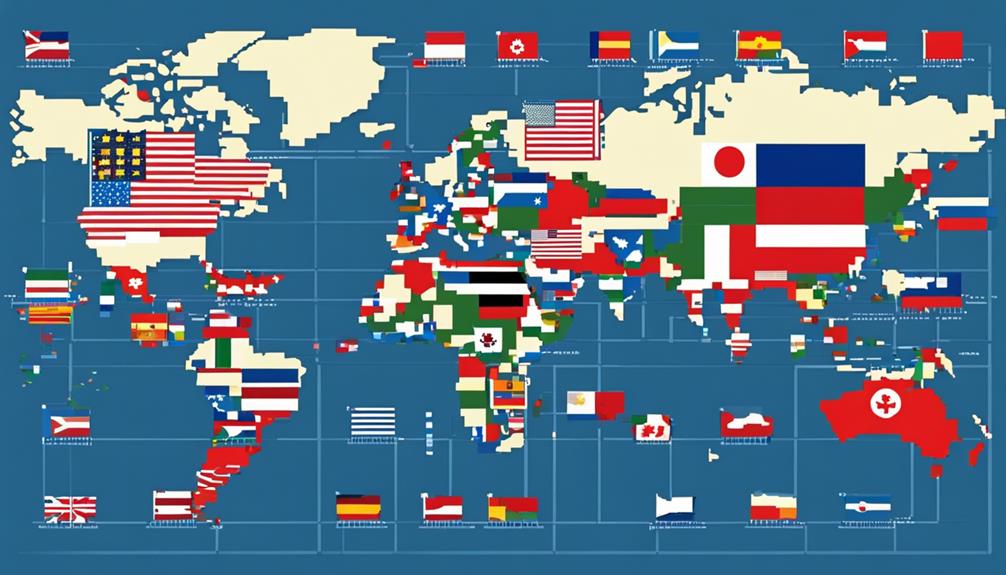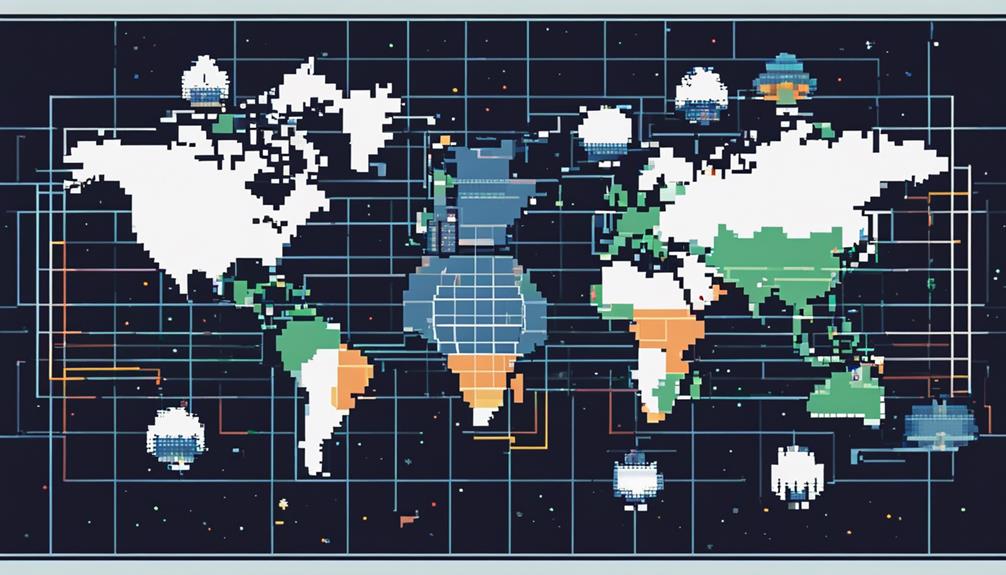ITU's pivotal role in global satellite communication is undeniable, with its intricate oversight of spectrum allocation, orbital positioning, and technical standards shaping the landscape of modern connectivity. By ensuring equitable access to the radio frequency spectrum and fostering international collaboration, ITU sets the stage for seamless satellite communication on a global scale. The organization's dedication to advancing satellite technologies and mitigating interference challenges underscores its commitment to universal connectivity. Explore further how ITU's initiatives are propelling satellite communication to new frontiers of innovation and accessibility.
Key Takeaways
- ITU regulates spectrum and satellite orbits globally.
- Ensures compliance with standards and facilitates coordination.
- Manages orbit resources efficiently to minimize interference risks.
- ITU's efforts enhance reliability and integrity of satellite networks worldwide.
ITU's Mandate in Satellite Communication

ITU's pivotal mandate in satellite communication encompasses the regulation and oversight of the international radio-frequency spectrum and satellite orbit resources essential for the efficient operation of global telecommunication networks. The International Telecommunication Union (ITU) plays a critical role in ensuring that satellite communication activities adhere to established regulations and standards. By overseeing the proper utilization of the radio frequency spectrum, ITU facilitates the coordination of satellite services on an international scale.
In the realm of satellite communication, ITU's mandate is fundamental for maintaining order and harmony among the various stakeholders involved in the global telecommunication network. Through the implementation of international guidelines, ITU contributes to the seamless connectivity of satellite services worldwide. Satellite users must understand and comply with ITU regulations to ensure the effective functioning of their communication systems within the allocated frequency bands and orbital slots.
ITU's mandate in satellite communication extends beyond national borders, emphasizing the importance of cooperation and coordination among countries to avoid interference and conflicts in the utilization of satellite resources. By setting standards and overseeing compliance, ITU fosters a conducive environment for the growth and sustainability of global satellite communication networks. This regulatory framework ensures the efficient operation of satellite services and promotes innovation in the field of telecommunications on a global scale.
Frequency Allocation and Management
Ensuring the efficient allocation and management of radio frequency spectrum is paramount in the realm of global satellite communication. The International Telecommunication Union (ITU) plays a crucial role in overseeing this process to facilitate effective communication networks and global connectivity. Several key aspects characterize ITU's involvement in frequency allocation and management:
- Spectrum Allocation: ITU is responsible for assigning specific radio frequency bands to satellite operators, ensuring that each operator operates within approved frequencies to prevent interference and optimize communication services.
- Frequency Coordination: The organization establishes regulations and standards for coordinating frequencies among satellite operators, promoting a harmonized approach to spectrum management.
- International Cooperation: ITU fosters collaboration among countries and satellite operators to address spectrum allocation disputes, harmonize practices, and enhance global satellite communication services.
- Compliance with ITU Regulations: Satellite operators must adhere to ITU regulations to operate within allocated frequency bands, ensuring compliance and efficient use of the radio spectrum for satellite communication purposes.
ITU's efforts in spectrum allocation and management are essential for the effective functioning of satellite communication systems, supporting global connectivity and the seamless operation of communication networks.
Satellite Orbit Coordination Responsibilities

ITU's satellite orbit coordination responsibilities encompass crucial tasks such as orbit slot allocation and implementing interference mitigation measures. By managing the allocation of orbital slots, ITU ensures that satellite operators can coexist harmoniously without causing interference. Additionally, the implementation of interference mitigation measures by ITU helps maintain the integrity and efficiency of global satellite communication networks.
Orbit Slot Allocation
Satellite orbit slot allocation plays a crucial role in ensuring the efficient utilization of geostationary orbit resources and minimizing the risk of interference and collisions in space.
- Efficient utilization of geostationary orbit
- Fair access to orbital locations
- Minimization of signal interference and collision risks
- Facilitation of satellite communication systems deployment
Interference Mitigation Measures
With a focus on maintaining the integrity and efficiency of global satellite communication networks, interference mitigation measures play a pivotal role in satellite orbit coordination responsibilities. ITU's coordination of satellite orbits aims to prevent interference, ensuring secure and efficient communication via satellite systems. By minimizing the risk of signal overlap and frequency conflicts among satellites, ITU's interference mitigation measures contribute to the smooth operation of international telecommunication networks. These efforts support global connectivity by managing spectrum resources effectively. The organization's responsibilities in satellite orbit coordination enhance the reliability and sustainability of satellite communication systems, ultimately facilitating secure and uninterrupted communication services on a global scale.
Spectrum Monitoring and Enforcement
ITU's spectrum monitoring efforts play a crucial role in ensuring compliance with spectrum regulations and preventing interference in satellite communication signals. Through strict enforcement measures, ITU works to maintain the integrity and reliability of global satellite communication networks. These activities contribute to the effective coordination and operation of satellite services on a worldwide scale.
Spectrum Regulation Compliance
Ensuring compliance with spectrum regulations in global satellite communication systems involves vigilant monitoring and enforcement to maintain interference-free operations and efficient spectrum utilization.
- Proper spectrum regulation compliance is crucial for the reliable operation of satellite communication systems worldwide.
- ITU plays a key role in monitoring and enforcing the allocation and use of radio frequencies to prevent interference.
- Monitoring spectrum usage aids in identifying violations and upholding the integrity of satellite communication networks.
- Enforcement actions, such as coordinating with national authorities and resolving frequency conflicts, are essential in ensuring spectrum compliance and the seamless functioning of global satellite communication services.
Enforcement Measures Implemented
Implementing effective spectrum monitoring and enforcement measures is paramount in maintaining the integrity and reliability of global satellite communication networks. The ITU implements spectrum monitoring to ensure interference-free use of radio frequencies for satellite communication. Enforcement actions by the ITU resolve spectrum interference issues, regulating the global satellite communication network and preventing unauthorized spectrum usage. These measures contribute significantly to the stability and reliability of satellite communication systems worldwide. Furthermore, ITU's role in enforcing spectrum regulations fosters international cooperation and coordination, essential for managing radio frequency spectrum efficiently.
| Spectrum Monitoring | Enforcement Actions | Global Network | International Cooperation |
|---|---|---|---|
| Interference-free use | Resolving interference | Regulating spectrum usage | Fostering cooperation |
International Collaboration for Satellite Networks

Facilitating seamless collaboration among nations, the International Telecommunication Union (ITU) plays a crucial role in optimizing the operation of global satellite networks. Through international collaboration, ITU ensures that satellite network operation is efficient and effective worldwide. Key aspects of ITU's efforts in this domain include:
- Satellite Frequency Assignments: ITU coordinates satellite frequency assignments to prevent interference in global communications. By managing and allocating frequencies, ITU helps avoid conflicts and ensures smooth operations for satellite networks.
- Equitable Access: ITU promotes equitable access to satellite resources for all member states. This ensures that countries, regardless of their size or resources, have fair opportunities to benefit from satellite technology and services.
- Shared Satellite Usage: ITU facilitates agreements among countries for shared satellite usage and benefits. By encouraging collaboration and mutually beneficial arrangements, ITU enhances the efficiency and reach of international satellite networks.
- Regulatory Support: ITU's guidelines and regulations provide essential regulatory support for the smooth functioning of international satellite networks. By setting standards and best practices, ITU helps maintain the integrity and reliability of satellite communications on a global scale.
Through these initiatives, ITU fosters cooperation among nations, promotes effective satellite network management, and contributes to the advancement of global connectivity.
Addressing Interference Issues in Satellite Communication
ITU plays a pivotal role in mitigating interference issues in satellite communication through its regulation and coordination of radio-frequency spectrum usage. Interference, such as signal overlap or unauthorized transmissions, poses significant challenges to satellite communication services and networks. To address these issues, ITU establishes international regulations and standards aimed at reducing interference and ensuring the efficient operation of satellite communication systems.
By setting guidelines for the allocation of radio frequencies to different satellite systems, ITU helps prevent signal conflicts that can disrupt communication links. Additionally, ITU fosters coordination among member states and satellite operators to combat interference effectively. This collaboration is crucial for maintaining the integrity of satellite communication networks and ensuring global connectivity.
Efficient management of interference in satellite communication is vital for supporting various critical services, including emergency response efforts. Without proper regulation and coordination, interference can lead to service disruptions and impact the reliability of satellite communication systems worldwide.
ITU's efforts in addressing interference in satellite communication underscore the importance of international cooperation and adherence to established regulations and standards. By promoting a harmonized approach to spectrum management, ITU plays a key role in safeguarding the effectiveness and reliability of satellite communication for diverse applications and users globally.
Facilitating Satellite Communication Standards

The establishment of standardized protocols for satellite communication is essential for ensuring seamless global connectivity and operational efficiency. The International Telecommunication Union (ITU) plays a pivotal role in facilitating satellite communication standards to achieve this goal. By setting guidelines and regulations, the ITU promotes interoperability, spectrum harmonization, and compliance within the satellite communication industry. This not only helps prevent interference but also fosters international cooperation and coordination among stakeholders.
- Interoperability: ITU standards ensure that different satellite communication systems can work together efficiently, regardless of their origin or specifications.
- Efficiency: By adhering to ITU guidelines, satellite operators can optimize their resources and processes, leading to more efficient and cost-effective operations.
- Regulations: ITU regulations provide a framework for managing satellite communication activities, addressing issues such as frequency allocation and orbital positions.
- Spectrum Harmonization: ITU promotes spectrum harmonization to ensure that the limited radio-frequency spectrum is utilized effectively and equitably among satellite operators.
ITU's Role in Disaster Response and Recovery via Satellites
Standardized protocols set by the International Telecommunication Union (ITU) not only ensure seamless global connectivity in satellite communication but also play a vital role in facilitating disaster response and recovery efforts through satellite utilization. In times of crisis situations such as natural disasters, ITU leverages satellites for rapid disaster response and recovery worldwide. By utilizing satellite communication, ITU can swiftly establish emergency communication networks, enabling effective coordination and response mechanisms.
ITU's coordination of satellite resources is instrumental in providing critical communication links during disasters. Satellites serve as a lifeline in restoring communication infrastructure post-natural disasters, ensuring that response efforts are coordinated and information is disseminated efficiently. This utilization of satellites significantly enhances global disaster preparedness and response capabilities, enabling swift and effective responses to mitigate the impact of disasters.
Through the strategic deployment of satellite resources, ITU strengthens emergency communication networks, enabling authorities and relief organizations to coordinate rescue operations and deliver aid promptly. The use of satellites in disaster response and recovery efforts highlights ITU's commitment to leveraging technology for humanitarian purposes and underscores the importance of satellite communication in enhancing resilience and response capabilities on a global scale.
Frequently Asked Questions
What Is the Role of the Itu?
International regulations in the telecommunication sector are critical for ensuring global cooperation and equitable access to communication technologies. Spectrum allocation, frequency management, and standardization processes are key components of the regulatory framework. Policy development and industry guidelines ensure efficient satellite coordination. For example, establishing guidelines for satellite operators can enhance the interoperability of satellite networks, promoting seamless communication services worldwide.
What Is the ITU Responsible For?
The International Telecommunication Union (ITU) is responsible for satellite regulation, spectrum allocation, frequency coordination, international standards, telecommunication development, satellite licensing, global connectivity, emergency communications, interference management, and orbital slots. These responsibilities ensure the efficient operation of the global telecommunication network, proper utilization of the radio frequency spectrum, and compliance with international regulations by satellite users.ITU's authority extends to overseeing the coordination and allocation of satellite frequencies.
What Is the ITU in Networking?
In the realm of networking, the ITU plays a pivotal role in setting network standards, managing satellite frequencies, regulating telecommunication practices, and overseeing spectrum management. Its involvement ensures global connectivity, promotes satellite technology advancements, enforces communication policies, fosters international cooperation, enhances digital infrastructure, and facilitates satellite coordination. By upholding these responsibilities, the ITU contributes to the efficiency and effectiveness of networking systems on a global scale.
What Does ITU Control?
ITU controls a range of critical aspects related to satellite communication. This includes spectrum allocation, frequency coordination, satellite licensing, interference prevention, orbital slot management, regulatory compliance, emergency communications, geostationary orbit monitoring, global coverage oversight, and setting satellite standards. These responsibilities ensure the efficient and effective operation of satellite networks, promoting fair access, innovation, and global connectivity in the satellite communication sector.
